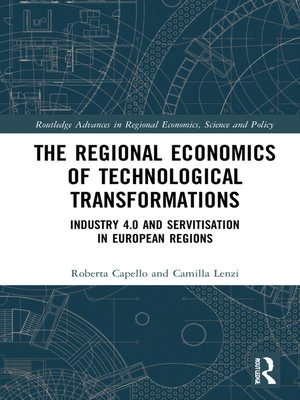The Regional Economics of Technological Transformations
ebook ∣ Industry 4.0 and Servitisation in European Regions · Routledge Advances in Regional Economics, Science and Policy
By Roberta Capello

Sign up to save your library
With an OverDrive account, you can save your favorite libraries for at-a-glance information about availability. Find out more about OverDrive accounts.
Find this title in Libby, the library reading app by OverDrive.



Search for a digital library with this title
Title found at these libraries:
| Library Name | Distance |
|---|---|
| Loading... |
The Regional Economics of Technological Transformations provides a comprehensive overview of 4.0 technological transformations in Europe and their socio-economic impact, with a particular emphasis on the regional dimension of the phenomena. The authors employ extensive original data and robust quantitative methods to analyse technological change in all regions of the 27 EU countries plus the UK and shed light on this trend for Europe and beyond.
Structured in four parts, the book first looks at conceptual definitions, empirical measurements and expected impacts on both the economic performance (GDP and productivity growth) and the labour market, and then moves on to analyse where 4.0 technological transformation actually takes place in Europe and the reasons for this. Next, it offers original empirical evidence on the impacts of the different transformations, and of their intertwined effects, on both the economy and the society. Finally, the book explores the policy implications of this technological transformation.
This book will be valuable reading for advanced students, researchers and policymakers working across regional economics, industrial economics and innovation policy. It will be of primary interest to regional scientists interested in the field, who may enjoy the conceptual and empirical solutions to the study of a very complex, timely and still largely unexplored theme. Sociologists, engineers and political economists can benefit from the book's analysis, noting the urgency of the development of new ethical rules governing the new digital and labour markets. Finally, the book may appeal to policymakers interested in opportunities to increase regional competitiveness and sustainability goals through the advent of 4.0 technologies.







